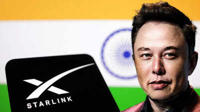Starlink Achieves Regulatory Milestone
Elon Musk's Starlink has recently obtained a license from the Department of Telecommunications (DoT) in India, representing a significant step towards launching commercial satellite internet services in the country. This makes Starlink the third company, following Eutelsat's OneWeb and Reliance Jio Satellite Communications, to achieve this licensing milestone, while Amazon's Kuiper awaits its own approval.
Future of Satellite Communications in India
The DoT confirmed that Starlink will receive trial spectrum within 15 to 20 days, allowing it to begin testing its satellite communications systems. Before initiating services, however, Starlink must conform to several security regulations, including lawful interception access, ensuring compliance with India's stringent connectivity norms.
Tensions in the Air
Interestingly, the announcement of Starlink's licensing coincided with a public dispute between Musk and former US President Donald Trump. Musk's earlier critiques of Trump’s fiscal policies and subsequent altercations regarding contract terminations could suggest a turbulent transitional phase for the billionaire businessman. Such events may overshadow Starlink's progress in India, further complicating its public perception.
Background of Starlink's Licensing Journey
The approval process took almost two years, delayed due to concerns about national security and compliance with new operating standards. Recently, Starlink finalized agreements with major telecom firms Reliance Jio and Bharti Airtel, partners that control over 70% of India’s telecommunications market. These collaborations are crucial for Starlink as it positions itself to deliver high-speed satellite internet services in a market traditionally dominated by terrestrial providers.
Challenges and Opportunities Ahead
Newly issued security norms mandate that satellite communication service providers, including Starlink, must meet specific interoperability and monitoring requirements. The government has also declared that 20% of the ground segment infrastructure needs to be indigenized within a few years of operation. This regulation reflects India's commitment to ensuring that foreign service providers contribute to the local economy and adhere to national security standards.
Financial Regulations and Industry Response
Starlink will be required to pay 4% of its adjusted gross revenue as spectrum fees, along with an annual charge of Rs 500 per subscriber for urban users, an additional levy not applied to rural services. These financial obligations have led some industry stakeholders, including the Cellular Operators Association of India (COAI), to raise concerns about the potential impact on market competitiveness and the sustainability of satellite services compared to terrestrial networks.
The Road Ahead
Despite the hurdles, the approval poses a significant potential boon for internet access in underserved areas of India, where conventional services have struggled to establish reliable connections. With Starlink’s low Earth orbit satellite network, users in remote locations could finally receive high-quality broadband, a game changer for education, telehealth, and economic development.
As Starlink navigates its regulatory obligations and broader operational challenges, it also signifies a pivotal shift in India’s telecommunications landscape. The anticipated launch of its services raises prospects of expanded connectivity options that could alter the dynamics of internet provision across both urban and rural realms in the country.
Bias Analysis
Key Questions About This Article




